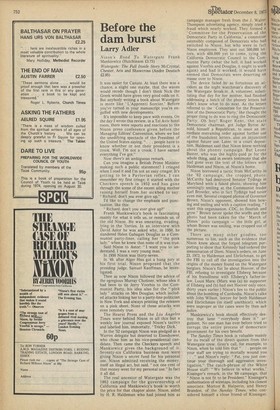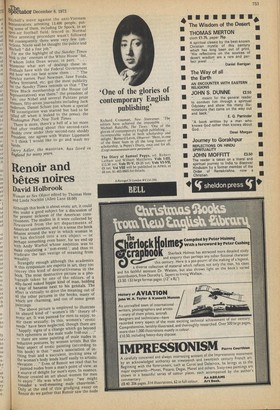Before the dam burst
Larry Adler
Nixon's Road To Watergate Frank Mankiewicz (Hutchinson £3.75) Watergate: The Full Inside Story McCrystal, Chester, Aris and Shawcross (Andre Deutsch £2.95)
It was easier for Canute. At least there was a chance, a slight one maybe, that the waves would recede though I don't think Nick the Greek would have given very good odds on it. But anybody writing a book about Watergate is more like ' L'Apprenti Sorcier.' Before you've turned in your manuscript you're engulfed with new developments.
It's impossible to keep pace with events. On the day I wrote this review, in a Tel Aviv hotel room, there were reports and reactions to the Nixon press conference given before the Managing Editors' Convention, where we had the unedifying spectacle of the President of the United States saying, " . . . people have to know whether or not their president is a crook. Well, I'm not a crook. I have earned everything I've got,"
Now there's an ambiguous remark.
Can you imagine a British Prime Minister making such a public statement? I cringed when I read it and I'm not an easy cringer. It's getting to be a Pavlovian reflex. I can remember my first cringe; it started with the Checkers speech in 1952 and has gone through the scene of the recent ailing mother raising herself from, her sickbed to say: "Richard, don't you ever give up."
I'd like to change the emphasis and punctuation. like this:
"Richard, don't you ever give up?"
Frank Mankiewicz's book is fascinating mainly for what it tells us, or reminds us, of the old Nixon. He was smearing, evading, lying in the 'forties, In an interview with David Astor he was asked why, in 1950, he slandered Helen Gahagan Douglas as a Communist party-liner, calling her "the pink lady," when he knew that none of it was true.
Said Nixon to Astor: "I want you to understand, I was a very young man."
In 1950 Nixon Was thirty-seven.
• In '49, after Alger Hiss got a hung jury at his first trial, Nixon proposed that the presiding judge, Samuel Kauffman, be investigated. Then as now Nixon followed the advice of the egregious Murray Chotiner, whose idea it had been to tie Jerry Voorhis to the Communist Party, his idea also for the " pink lady" attacks on Mrs Douglas, which included attacks linking her to a party-line politician in New York and always printing the releases on a pink sheet. None of these attacks was even remotely true.
The Hearst Press and the Los Angeles Times were behind Nixon in all this but a weekly law journal exposed Nixon's tactics and labelled him, immortally, 'Tricky Dick.'
In the '52 campaign Nixon was pledged as a Warren delegate but deserted to Eisenhower, who chose him as his vice-presidential candidate. Then came the Checkers speech and Mankiewicz gives the background of it. Seventy-six California business men were giving Nixon a secret fund for his personal use. Nixon admitted receiving the money, itself an illegal act, but said, "not one cent of that money went for my personal use." In fact it all did.
The real ancestor of Watergate was the 1962 campaign for the governorship of California and Mankiewicz's book is worth the price for that chapter alone. Nixon, aided by H. R. Haldeman who had joined him as campaign manager fresh from the J. Walter Thompson advertising agency, simply tried a fraud which nearly worked. They formed a 'Committee for the Preservation of the Democratic Party in California,' a committee ostensibly composed of Democrats who had switched to Nixon, but who were in fact Nixon employees. They sent out 500,000 letters, with 900,000 yet to come, tying the California Democratic Council to the Communist Party (what the hell, it had worked against Voorhis and Douglas, it ought to work again) and had it worked, it would have .seemed that Democrats were deserting en masse over to Nixon.
The device failed by as fortuitous an accident as the night watchman's discovery of the Watergate break-in. A volunteer, substituting that day for her mother, had finished addressing a batch of the phoney letters but didn't know what to do next. As the letters referred to the 'Committee for the Preservation of the Democratic Party,' he thought the proper thing to do was to ring the Democratic Party. Oh boy! Roger Kent, the state Democratic chairman, got Judge Byron Arnold, himself a Republican, to issue an immediate restraining order against further use of the fraudulent letters, also an injunction against future use. Later, in a court deposition, Haldeman said that Nixon knew nothing about the phoney campaign. But Leone Baxter, who was the highly-paid pr for the whole thing, said in sworn testimony that she had gone over the text of the letters with Haldeman and Nixon, at Nixon's home.
Nixon borrowed a tactic from McCarthy in the '62 campaign, the cropped photo. McCarthy had destroyed Senator Tydings in Maryland with a faked photo; showing him seemingly smiling at the Communist leader Earl Browder, who in fact Tydings had never even met. Several cropped photos of Governor Brown, Nixon's opponent, showed him bowing and smiling and with a caption reading, " I want this organisation, CDC, to flourish and grow." Brown never spoke the woe& and the photo had been taken for the ' March of Dimes' polio campaign — the little girl, at whom Brown was smiling, was cropped out of the picture.
There are many other goodies, too numerous to list, such as the evidence that ,Nixon knew about the forged telegram purporting to shOw that Kennedy had ordered the assassination of Diem. Nixon's orders, on June 23, 1972, to Haldeman and Ehrlichman, to get the FBI to call off the investigation into the origins of the money found on the Watergate burglars. Nixon's flat lie about Hoover, of the FBI, refusing to investigate Ellsberg because of his friendliness with Ellsberg's father-inlaw, Louis Marx. (Marx was (a) no supporter of Ellsberg and (b) had met Hoover only once, thirty years earlier.) Nixon's lies to the public about the bombing of Cambodia. Nixon's talks with John Wilson, lawyer for both Haldeman and Ehrlichman (in itself unethical), which were improper as the cases were by then sub judice.
Mankiewicz's book should effectively destroy that lame "everybody does it" ar-' gument. No one man has ever before tried to corrupt the entire process of democratic government for his own benefit.
The Sunday Times book is valuable mainly for its recall of the direct quotes from the Watergate crew. Gray's call, for example, to Nixon, when he told him that " . . . people on your staff are trying to mortally wound you . . " and Nixon's reply: "Pat, you just continue your thorough and aggressive investigation." The catch-phrase of the White House staff: " We believe in what works." Kissinger's remark, in the '68 campaign, that "Nixon is not fit to be President." Kissinger's. authorisation of wiretaps, including his closest associate, Morton B. Halperin, and Henry Brandon, of the Sunday Times, who considered himself a close friend of Kissinger. Mitchell's move against the anti-Vietnam demonstrators. arresting 13,400 people, putting some of them, including Dr Spock, in an 'Pen-air football field, fenced in. Normal Police arresting procedure wasn't followed and consequently there were very few conviCtions. Nixon said he thought the police and Mitchell " did a fine job."
• Por me the highlight of the Sunday Times
000k is the 'enemies of the White House ' list, af whom John Dean wrote, in part, " . . . determine what sort of dealings these individuals have with the Federal Government and how we can best screw them . . ." The „showbiz names, Paul Newman, Jane Fonda. parbra Streisand, etc, got the most publicity °in the Sunday Times reminds us that "The entire Black membership of the House (of ,Representatives) was there," the president of Yale, one Nobel and several Pulitzer prize winners, fifty-seven journalists including Jack Anderson, Daniel Schorr (on whom a special gal investigation was started but had to be called off when it leaked to the press), the Washington Post, New York Times.
There is more, there's a hell of a lot more. And after reading about this second-rate, Shoddy crew under their second-rate shoddy President, one agrees with Walter Lippmann
• think I would like to go and wash my hands.
Larry Adler, the musician, has lived in flgland for many years.











































 Previous page
Previous page